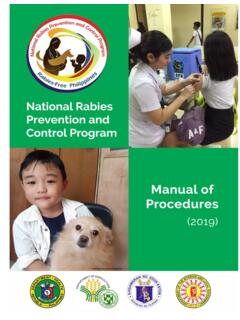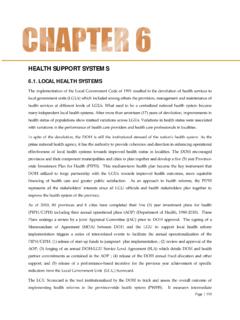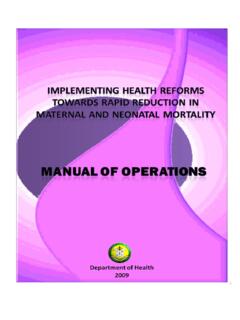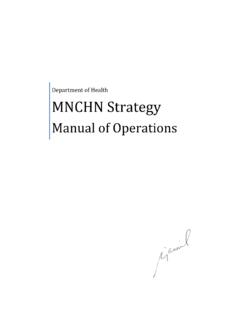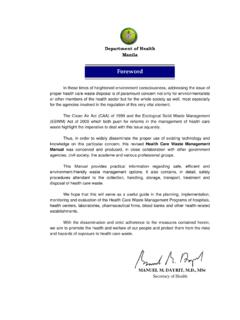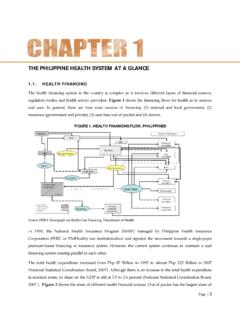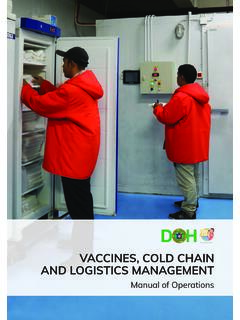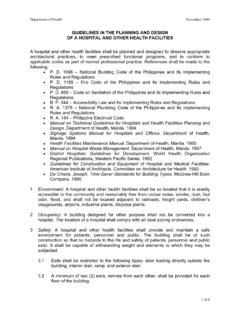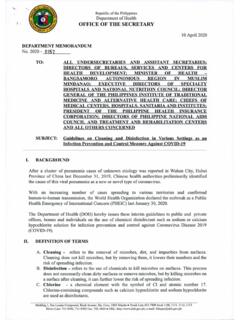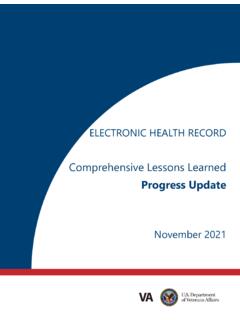Transcription of National Unified Health Research Agenda 2017-2022
1 I National Unified Health Research Agenda 2017-2022 ii ISSN 1908-4250 iii Table of Contents List of v Preface .. vii Health Research Agenda , The Philippine Experience .. 1 How the Agenda was Made .. 3 Inputs for Agenda Setting Process .. 4 Documents Reviewed .. 6 Regional Consultations .. 7 National Consultation .. 7 Thematic 8 Research Priorities ..11 Responsive Health systems ..12 Research to enhance and extend healthy lives ..13 Holistic approaches to Health and wellness ..14 Health resiliency ..15 Global competitiveness and innovation in Health ..16 Research in equity and Health ..17 References ..18 Annex A. List of regional consultations Annex B. List of criteria used in prioritization during the regional consultations ..20 Annex C. List of participating agencies ..21 Annex D. The NUHRA Icon ..22 Annex E. PNHRS Research Agenda Committee ..23 iv v LIST OF ACRONYMS AIDS acquired immune deficiency syndrome AIHO Alliance for Improving Health Outcomes, Inc.
2 ARMM Autonomous Region of Muslim Mindanao CAR Cordillera Administrative Region CHED Commission on Higher Education CVD cardiovascular disease DOH Department of Health DOST Department of Science and Technology DSWD Department of Social Welfare and Development HEI higher education institution HIV human immunodeficiency virus LGU local government unit MersCoV Middle East Respiratory Syndrome - Coronavirus NGO non-government organization NUHRA National Unified Health Research Agenda PCHRD Philippine Council for Health Research and Development PDP Philippine Development Plan PHA Philippine Health Agenda PITAHC Philippine Institute of Traditional and Alternative Healthcare PNHRS Philippine National Health Research System RAC Research Agenda Committee RUHRA Regional Unified Health Research Agenda SARS severe acute respiratory syndrome STI sexually transmitted infection UPM University of the Philippines Manila WHO World Health Organization vi vii PREFACE The Philippines is at a turning point where it is slated to reap the benefits of Health Research investments towards the country s economic, social and scientific growth.
3 The Philippine National Health Research System (PNHRS) promotes investment in Health Research in the country. It ensures that Health Research is linked to the Health system needs and opportunities; it directs investments in Health Research towards upholding the National interest; and it stimulates National , local and international partnerships and networks for Health Research and development. The core of the PNHRS lies in the formulation of the National Unified Health Research Agenda (NUHRA), which summarizes the Health Research and development directions of the country for a six-year period. The Agenda was disseminated to Health Research generators, funders, and end users to advance Health through strengthening Research activity, generating support and funding, prioritizing investments, and promoting the translation of Research to Health practice, products, and services. Predating the formalization of the PNHRS in 2013 through RA 10532, the Philippine Council for Health Research and Development (PCHRD) has already facilitated two earlier versions of the NUHRA: (1) NUHRA 2006-2010, prepared by the Working Committee on Research Management for the NUHRA, and (2) NUHRA 2011-2016 prepared by the Research Agenda Committee (RAC).
4 Regional stakeholder consultations were the foundation of the first NUHRA upon which a National consultation was fashioned. On the other hand, the second NUHRA had strong National directions from the Agenda of the core agencies. The current NUHRA 2017-2022 , on the other hand, was developed through bottom-up approach via the 17 regional consultations, and top-down consultations, via the review of Research Agenda of individual government agencies and non-government organizations (NGOs). Technical papers and robust regional situationers providing contextual analysis, vision and strengths were key inputs to all consultations. The current NUHRA also strove to be more broad-based, seeking input from stakeholders whose work affect people s Health . The development of the NUHRA 2017-2022 was made possible through the combined efforts of various teams of researchers, academics, government officials, Health professionals, and Health policy experts all over the Philippines.
5 The Alliance for Improving Health Outcomes, Inc. (AIHO), a group of young public Health professionals and policy experts, designed the framework of the current NUHRA using the newly-developed PNHRS Guidelines for Health Research Prioritization (2016). Regional consortia and stakeholders, likewise, deserve merit for dedicating time to fully participate in multiple consultations throughout the country, providing a prismatic lens into the current Health status of the regions. National consultation participants must also be commended for offering their insights to provide a top-down perspective into the Health Research Agenda . Finally, the PCRHD has been an invaluable ally throughout the entire process. Their efforts to facilitate funding and coordination enabled the participation of this immense network of stakeholders to ensure a diverse and inclusive Health Research Agenda . NUHRA 2017-2022 summarizes the areas of Research that all of us can promote, work together, fund, and support.
6 - PNHRS Research Agenda Committee 2017 viii 1 Health Research Agenda , THE PHILIPPINE EXPERIENCE The Philippines has been a pioneer in the development of Unified Health Research Agenda allowing the government to facilitate the growth of National and local institutions (Angulo et al, 2006). The NUHRA guides Health Research and development efforts in the country, and given recent developments in local capacity, education, among others, catalyzes the development of the local Health economy. The NUHRA 2006-2010 & NUHRA 2011-2016 Figure 1 The NUHRA 2006-2010 was constructed using a bottom-up approach, wherein regional consultations yielded regional priorities that were elevated to the NUHRA. W hile the NUHRA 2011-2016 was designed through a top-down approach, wherein consolidated priorities of the PNHRS core agencies comprised the NUHRA, which was then disseminated for implementation at the regional and local levels.
7 The design and implementation of each version of the NUHRAs succeeded in their own rights. The 2006-2010 edition outlined 422 Research priorities, produced through regional and National consultations. It was commended for its inclusive approach in engaging stakeholders from the regional level, including NGOs and public and private higher education institutions (HEIs). However, only 22% of the identified Research priorities was addressed by the culmination of the NUHRA 2006-2010. For the NUHRA 2011-2016 edition, PNHRS core agencies conducted their own consultations and Research priority setting activities. The number of Research priorities identified were 56 topics. However, uptake of these topics improved. Forty-five priority topics were addressed by Research . However, despite remarkable efforts by the Department of Science and Technology (DOST)-PCHRD in the Health sector to promote basic science Research and pilot Research studies as well as to advance funding sources and mechanisms, underdeveloped indicators for monitoring and evaluation were unable to match the pace of Research generation and provide an accurate picture of the country s Research output.
8 Figure 2 Approximately 80% of NUHRA 2011-2016 was addressed. On the other hand, only 22% of NUHRA 2006-2010 was studied. In reviewing prior editions of the NUHRA, it is apparent that an effective Health Research Agenda relies on an accurate identification of the Health issues and needs of the country. However, the NUHRA 2006-2010 NUHRA 2011-2016 NUHRA 2006-2010 NUHRA 2011-2016 DOH DOST CHED UPM-NIH National consultation Unaddressed Studied 2 success of implementation also hinges heavily on funding support, which is likely assured when aligned with government priorities. The value of inter-organizational and global partnerships is important and is related to the country s standing in the global economy. The NUHRA 2017-2022 Building on the achievements and the lessons learned from the previous editions, the current NUHRA 2017-2022 was designed to balance the inputs from the regional stakeholders and the National agencies. Moreover, an inclusive, realistic and collaborative approach was used.
9 NUHRA 2017-2022 is envisioned to be inclusive, realistic and collaborative. Inclusive comprehensive discussions and materials on regional and National Health issues, needs, and policies were considered Widened scope of regional and National stakeholder mapping was ensured to include typically under-represented sectors, such as marginalized populations, NGOs, and private businesses Collaborative Partnerships among academics, government agencies, NGOs, the private sector, and other actors were formed to advance Health Research Transparent and highly participatory processes were applied to engender ownership among stakeholders Evidence-based resources were used to promote informed decision-making Consultations were designed around an acute recognition of the diversity of interests among stakeholders Political directions and implications were outlined to assure strong alignment with National policies Realistic 3 HOW THE Agenda WAS MADE In 2016, the PNHRS developed its Guidelines for Health Research Prioritization which provided guidance to National and regional organizations on Agenda -setting in Health Research .
10 According to a comprehensive literature review, local experience, and interviews with key stakeholders in Research , effective Health Research prioritization should follow a three-phase framework. (PNHRS, 2016). First is the preparatory phase which includes information gathering and integration for contextualization of Health Research issues, mapping of stakeholders, planning for implementation, monitoring and evaluation, and information dissemination. This is followed by the second phase, which is the implementation phase; this aims at producing the Health Research Agenda through inclusive consultations. The guidelines prescribe the determination of criteria and application of the same to identify priority topics for inclusion into the Research Agenda . The third and final phase is the post-implementation phase, which emphasizes the importance of reporting the results, dissemination of the Agenda , monitoring and evaluation of Research generation and utilization, and updates to the Agenda .
